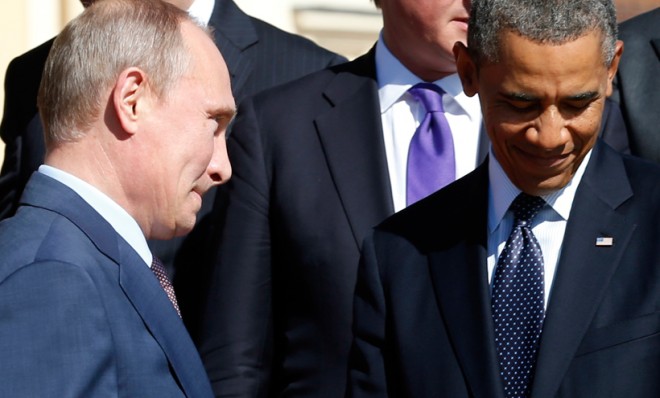Is the Cold War back?
Putin, and many Americans, appear to think so


A free daily email with the biggest news stories of the day – and the best features from TheWeek.com
You are now subscribed
Your newsletter sign-up was successful
Sen. John McCain (R-Ariz.) trashed Russian President Vladimir Putin in an op-ed published Thursday on Pravda.ru, an online successor of the Soviet-era Kremlin mouthpiece. The Russian president, McCain wrote, coddles tyrants (including Syrian President Bashar al-Assad), jails dissidents, and rigs elections. "Russians deserve better than Putin."
The broadside was McCain's response to Putin's recent opinion article in The New York Times, in which he ridiculed U.S. foreign policy and the idea of "American exceptionalism."
Feel the chill? A few short years after President Obama set out to reboot Washington's faltering relations with Moscow, a Cold War mentality appears to be creeping back.
The Week
Escape your echo chamber. Get the facts behind the news, plus analysis from multiple perspectives.

Sign up for The Week's Free Newsletters
From our morning news briefing to a weekly Good News Newsletter, get the best of The Week delivered directly to your inbox.
From our morning news briefing to a weekly Good News Newsletter, get the best of The Week delivered directly to your inbox.
As recently as 2006, 73 percent of Americans saw Russia as an ally or friend. Just 20 percent considered it an adversary. Now, according to a new Gallup poll, more Americans see Russia as a foe than an ally (50 percent vs. 44 percent). That's the first time in a decade that the balance has tilted so anti-Russia.
Blame Putin, and his open clashes with President Obama, over everything from his sheltering of National Security Agency leaker Edward Snowden to his protection of Assad. Putin's recent leadership on seizing Syria's chemical weapons may have won him some points with the U.S. public, says Matt Vasilogambros at National Journal, but a majority still have an unfavorable opinion of him.
President George W. Bush may have looked into Putin's eyes, saw his soul, and liked him, but the American people have looked into Putin's actions, saw his record, and didn't like what they saw. [National Journal]
In some ways, this does feel like the old Moscow-Washington rivalry. Yehuda Lukacs says at the Boston Herald that Putin is sponsoring fervently anti-U.S. regimes the Syria, Iran, and elsewhere in an attempt to reclaim the influence Moscow lost when the Soviet Union fell.
Putin, a former KGB officer during the old Cold War era, well versed in the game of realpolitik — the exercise of power politics — is determined to re-establish the old Soviet power in the Middle East and elsewhere. Obama, on the other hand, seems unable to respond to Putin's raw challenge. The president, however, must realize the new cold war is here to stay and the United States must change course and begin to stand up forcefully to Russia, which is contesting America's global leadership once again. [Boston Herald]
Russia indeed seems to be seizing every opportunity to tweak the U.S.. But does this really mean we're back to where we left off when the Soviet Union collapsed? "The answer is no," says Richard N. Haass at the Council on Foreign Relations. Putin's Times op-ed was just a "victory lap" after his proposal spared his ally, Assad, from a looming barrage of American missiles. The bottom line, though, is that Russia, unlike the Soviet Union, is no match for the U.S. militarily or economically, Haass says, so, "Putin will not want the competition to get out of hand."
A free daily email with the biggest news stories of the day – and the best features from TheWeek.com
While Putin can fairly claim to have won this round of diplomacy, through his own cleverness and Obama's multiple missteps, he cannot assume it is the harbinger of a trend, much less an era of global politics. Tactical triumphs cannot obscure or do away with the larger strategic reality of Russian limitations and weaknesses, and America's underlying power and reach. Ironically, it would take a very different Russia, one incompatible with Putin's authoritarianism, to be a 21st century power to be reckoned with. [Council on Foreign Relations]
Harold Maass is a contributing editor at The Week. He has been writing for The Week since the 2001 debut of the U.S. print edition and served as editor of TheWeek.com when it launched in 2008. Harold started his career as a newspaper reporter in South Florida and Haiti. He has previously worked for a variety of news outlets, including The Miami Herald, ABC News and Fox News, and for several years wrote a daily roundup of financial news for The Week and Yahoo Finance.
-
 The Olympic timekeepers keeping the Games on track
The Olympic timekeepers keeping the Games on trackUnder the Radar Swiss watchmaking giant Omega has been at the finish line of every Olympic Games for nearly 100 years
-
 Will increasing tensions with Iran boil over into war?
Will increasing tensions with Iran boil over into war?Today’s Big Question President Donald Trump has recently been threatening the country
-
 Corruption: The spy sheikh and the president
Corruption: The spy sheikh and the presidentFeature Trump is at the center of another scandal
